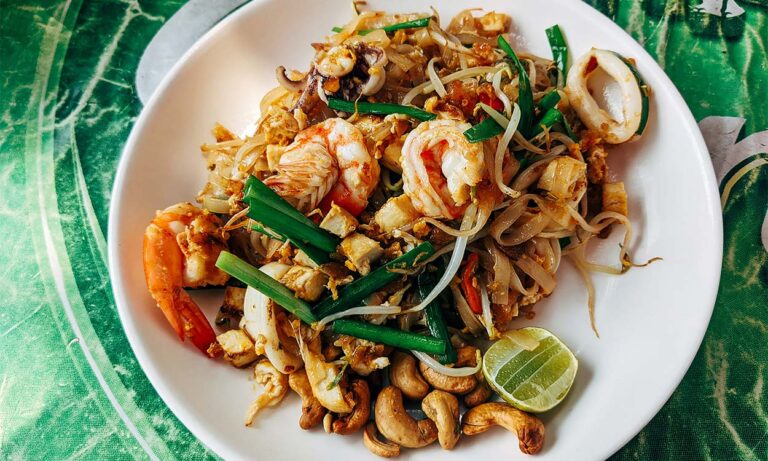Exposed: The fake history of pad Thai and the gastrodiplomacy behind it

Pad Thai is one of the most simple yet delicious dishes around. Rice noodles stir-fried with eggs and some tofu, shrimp or meat are the basis for the dish. It’s so damn tasty in fact, that some people claim there is a scientific reason behind it—the use of all five tastes which are salty, sour, sweet, spicy and bitter.
But what if I told you that, not too long ago, the now de facto dish in restaurants across London, New York City, Paris, and countless other cities, could hardly be found, not even in Thailand? From stolen origins to the government campaign that drove the popularity and similarity of Thai menus, here’s the wild (and partly fake) history behind pad Thai.
Gastrodiplomacy, or how to win hearts and minds through the stomach
Gastrodiplomacy, also known as culinary diplomacy, is a type of cultural diplomacy in which a country uses food in order to gain international influence. And although most people don’t know of it, this was something Thailand was particularly skilled at.
In 2002, the Thai government launched the ‘Global Thai’ programme with the aim of increasing the number of Thai restaurants around the world. The country provided training programmes, grants, and a whole lot of information to Thai investors who wanted to open restaurants abroad.
As part of this campaign, pad Thai—a dish with virtually no cultural history, but I’ll get to that in a second—was positioned as the country’s national dish. It spearheaded a culinary campaign funded by the Thai government which cost it 500 million baht ($15 million).
To put it simply, the government believed that the project would contribute to agricultural and food exports, while also producing foreign income from overseas transactions of goods and services. And it worked. I’m not telling you anything new when I say that Thailand’s cuisine has become a global phenomenon as a result of the project.
By 2011, the global number of Thai restaurants had increased to more than 10,000 and the nation positioned itself as the “kitchen to the world.” It also laid out strict standards for what diners can expect on menus.
As stated by Food & Wine: “Thailand’s Department of Export Promotion designed prototypes for three different styles of Thai restaurants.” First on the list was ‘Elephant Jump’, created for fast food, then ‘Cool Basil’ for mid-priced casual cuisine, and finally, ‘Golden Leaf’ for high-end meals.
To this day, Thai restaurants abroad can be awarded the ‘Thai Select’ award by the country’s government as long as their restaurants abide by its standards. To be considered authentic and high quality, these restaurants must meet certain criteria during inspections, including being open for at least five days a week, employing government-trained Thai chefs, and using Thai products.
Where does pad Thai actually come from?
In the 1930s, Thailand suffered from a loss of rice because of limited production in the rice fields and flooding. This led to major problems for both the nation’s economy and its citizens’ nutritional intake. It was around the same time that the region began to gradually modernise under US advice, with 1938 marking the year Plaek Phibunsongkram became Prime Minister, who immediately focused on putting it into practice.
To both Westernise and modernise the country, Phibun changed the country’s name from Siam to Thailand and banned local languages and dialects from the nation’s schools. That’s also when the Thai government began promoting rice noodles as a more efficient and cheaper alternative to rice, using only 50 per cent of the grain.
This led to the government conceiving the dish now known as pad Thai. Government officials assured the general public that by eating the dish, they were serving their country because, with a distinct national identity, they would be less vulnerable to exploitation by other national powers, as had occurred in other parts of Asia including Malaysia, Cambodia, and Vietnam.
But as Quartz highlighted, pad Thai isn’t even Thai. “Noodles, stir-fry, and, especially, noodle stir-fries are quintessentially Chinese. In fact, just about every ingredient found in pad Thai isn’t native to the people after whom the dish is named. […] Even the dish’s full name, kway teow pad Thai nods to its Chinese origins (kway teow is Chinese for rice noodles). Indeed, the Thai seem to agree—in Thailand, it’s explicitly referred to as a Chinese noodle dish.”





